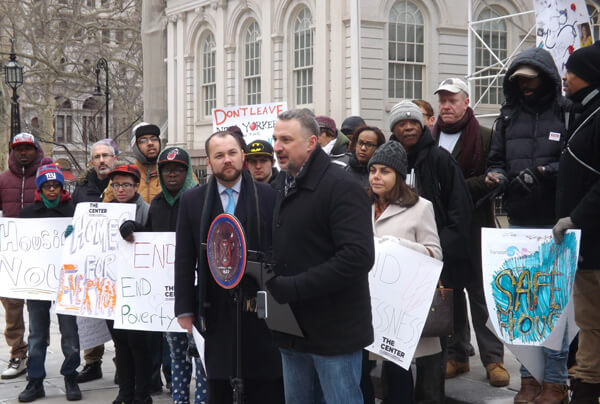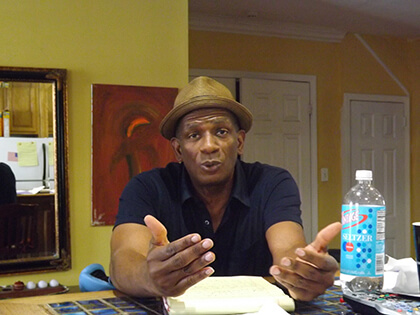An ACT UP poster from the 1980s. | NEW YORK PUBLIC LIBRARY DIGITAL ARCHIVE
When Mayor Ed Koch was running in the 1989 Democratic primary, speaking to voters at what is now called the Lesbian, Gay, Bisexual, and Transgender Community Center, he talked about the AIDS epidemic.
“When the history of this era is written, I believe it will show that the eventual victory over AIDS was made possible by heroes in the gay and lesbian communities who led that battle,” Koch said, according to the text of his remarks archived at LaGuardia Community College.
Implicit in his comments is that one person –– Mayor Ed Koch –– was not a leader in the fight against AIDS.
As evidenced by the attacks on his administration by AIDS activists when he was mayor and widespread denunciations of obituaries written about him since his February 1 death that ignored his poor response to the epidemic, the “heroes in the gay and lesbian communities” as well as bisexual and transgender New Yorkers would agree that Koch did not lead on AIDS.
What is disputed is why Koch’s response to AIDS was tepid and ineffective. A common explanation is that the mayor was a closeted homosexual and feared that leading on AIDS would blow open his closet door. At best, that is an improbable account of his motivations.
In 1974, then Congressman Koch co-sponsored legislation that would add sexual orientation to the Civil Rights Act of 1964. While Bella Abzug, who also represented part of Manhattan, was the leader on that legislation, few members of Congress were willing to put their names on the bill. It was re-introduced in 1975 with just 23 co-sponsors, including Koch.
As early as 1983, Koch was issuing proclamations declaring Gay Pride Week and he sold the West Village building that would become the LGBT Center to the community that year for $1.5 million. In 1986, Koch testified in favor of and signed legislation that added sexual orientation to the city’s anti-discrimination law. He also extended a few employee benefits to the domestic partners of city employees.
By 1981, when the first reports on AIDS appeared, Koch, who ran City Hall from 1978 through 1989, was already associated with the gay community and he continued that association.
The LaGuardia archive records suggest that Koch was initially disinterested in AIDS. He later opposed action because he did not want to spend the money necessary for an adequate response and he was unwilling to expend the political capital to defend what he viewed as controversial actions.
The first memos mentioning AIDS came from Dr. David Sencer, then New York City’s health commissioner, and were sent to Nathan Leventhal, the deputy mayor for operations. AIDS was discussed in two such memos in 1982, but it was only one of several items.
In May of 1983, Koch wrote to Sencer.
“I am growing increasingly concerned about the number of AIDS cases that are being reported,” the mayor wrote. “It seems we can expect a continual rise in the number of cases in the foreseeable future.”
Koch asked Sencer to convene the Board of Health to consider whether the city should require HIV testing of all donated blood, to recommend precautions for medical personnel, and to weigh how to create “appropriate medical facilities” for people with AIDS. He asked Sencer to convene the meeting within two weeks and said he would then meet with the board.
The records show that from 1985 through 1989, the internal Koch administration discussions were as concerned with how to pay for any response to AIDS and how to navigate the politics of that response as they were with taking steps to combat the epidemic in the first place.
Two 1985 memos to Koch from Victor Botnick, a mayoral special assistant, show City Hall implementing or planning initiatives, but Botnick also discusses funding mechanisms at length and notes where there is political opposition to a program. Botnick proposes solutions –– such as giving an AIDS housing site to a private group instead of having the city develop the housing –– in instances where he notes that opposition exists.
A number of obituaries said that Koch fought to reduce the city’s welfare rolls. One Botnick memo that discussed providing care for people with AIDS suggests the administration wanted to avoid establishing any new public benefits.
“I know that we were careful not to create a new entitlement program for home care since it would be very costly and we do not provide these services free of charge to any other group,” Botnick wrote. “However, the need for hospice services is unique to this group and would not be nearly as costly as home care since the number of patients are far fewer.”
City Hall was also aware of the criticism of its actions. New York City’s AIDS services were regularly compared to San Francisco’s, with New York always losing. An analysis by Botnick showed that the services and absolute dollars spent by each city were comparable; the caseloads were not. As of February 1985, San Francisco had 932 AIDS cases and New York City had 3,206.
Koch’s struggle with needle exchange illustrates the degree to which his administration would not champion controversial actions even when his health commissioner was telling him they would work.
In mid-1985, Sencer wrote Koch telling him that by “forcing addicts to use others’ needles and syringes, we are condemning large numbers of addicts to death from AIDS… Under these circumstances shouldn’t we attempt to practice preventive medicine and do something to interrupt the transmission of the virus? I think we should.”
Instead, Koch took the advice of Kenneth Conboy, his criminal justice coordinator, and first asked the city’s five district attorneys for their views on this “sensitive public policy question.”
Conboy recommended that Koch not yet approach the Legislature to change the state law requiring a prescription to possess a syringe. Conboy also wrote that since this was “principally a moral question, I think you should broach the matter privately with Cardinal O’Connor and other ranking spiritual leaders in the City.”
Faced with opposition that was intense in some quarters, Koch took no action until 1988 when the city’s health department opened a pilot needle exchange program that served just 200 drug injectors out of the estimated 200,000 in the city.
In an email to Gay City News, Charles Kaiser, a friend of Koch’s, wrote, “[T]here are many politicians who have tried to keep their sexuality a secret who have had terrible records on gay rights issues. Ed Koch does not fit in this category. He actually has the longest pro-gay rights record of any successful New York politician I know of… So whatever his failures during the AIDS crisis, I have never believed that they were a result of his own discomfort with who he was.”




































